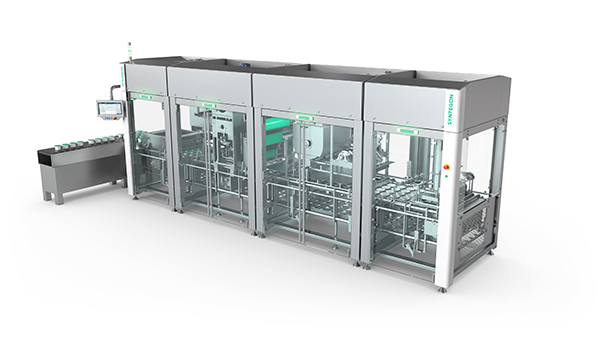Sponsored: Covering several hygienic levels

Image: Syntegon Syntegon’s LFS linear filling machine features a modular design and allows adjustments without long downtimes in order to respond to changing market requirements.
Whether refrigerated or not, with or without preservatives: dairy, delicatessen and plant-based foods not only differ in taste, viscosity or texture, but also come with varying hygienic requirements – and Syntegon’s filling machine portfolio addresses them all. With the new LFS, Syntegon is offering a flexible solution for clean, ultra-clean and aseptic filling.
Hygiene requirements for liquid or highly viscous food filling largely depend on where the products can be found in the supermarket. Goods that are filled under clean conditions are typically stored in the refrigerated foods section. They either have a short shelf life or one that has been extended by adding preservatives, such as vinegar in deli salads. For dairy and deli products as well as plant-based foods, such as yogurt, dips or spreads, manufacturers have to achieve the same shelf life without adding preservatives. Their solution is to disinfect the product’s packaging immediately before filling according to ultra-clean standards, or to rely on aseptic filling altogether. When processing baby food, manufacturers have several options as well: These products can be filled under aseptic conditions with higher disinfection rates and consequently higher product protection to ensure optimal product safety, supporting the distribution in ambient temperatures. In case the final product is sterilized with an autoclave, filling can occur under clean conditions.
All about disinfection
The right disinfection is key for achieving the required hygienic conditions. Machines in clean executions are best suited for processing products with an acidic pH value. Alternatively, manufacturers of retorted or HPP (high pressure processing) treated products can choose to preserve their products by means of pressure or heat in a separate machine after filling and sealing. Syntegon’s new LFS linear filling machine for preformed cups, containers and trays is available in a clean execution and is suited for acidic and HPP applications.
By integrating disinfection modules, filling machines are able to achieve a higher hygienic level. The LFS, which is also available in an ultra-clean execution, allows manufacturers to choose between two chemical-free disinfection methods for treating packaging inside the machine: UVC light or pulsed light. The FCL linear filling machine from the Syntegon portfolio uses a third method to disinfect cups and lids: hydrogen peroxide (H2O2) steam. In its aseptic execution, the machine is equipped with a double aseptic chamber to minimize the risk of food contamination and ensure maximum product protection.
Modular machine concept for optimal efficiency and flexibility
Being able to process a variety of products is key for achieving a competitive edge. In this context, flexible machines help keep pace with the fast-moving food market and secure future-proof operations. Since packaging formats, recipes and required output rates can change depending on the product in question, manufacturers benefit from systems with a modular design concept.
The new LFS cup filling machine from Syntegon follows the same principle as the proven FCL machine: its individual modules perform essential functions such as cup supply, disinfection, filling, sealing, capping, and cup discharge. Each of these modules can be individually configured, expanded or retrofitted at a later stage. They allow the LFS to be customized regarding the degree of automation, output and disinfection performance. In addition, the machine can be equipped with up to three servo-controlled dosing systems and can reliably fill different product viscosities with high precision and low product loss. All it takes is to exchange the nozzles of the dosing stations in a few simple steps. The machine’s ease of use helps manufacturers to perform fast product changes, contributing to a production that meets current and future requirements.
